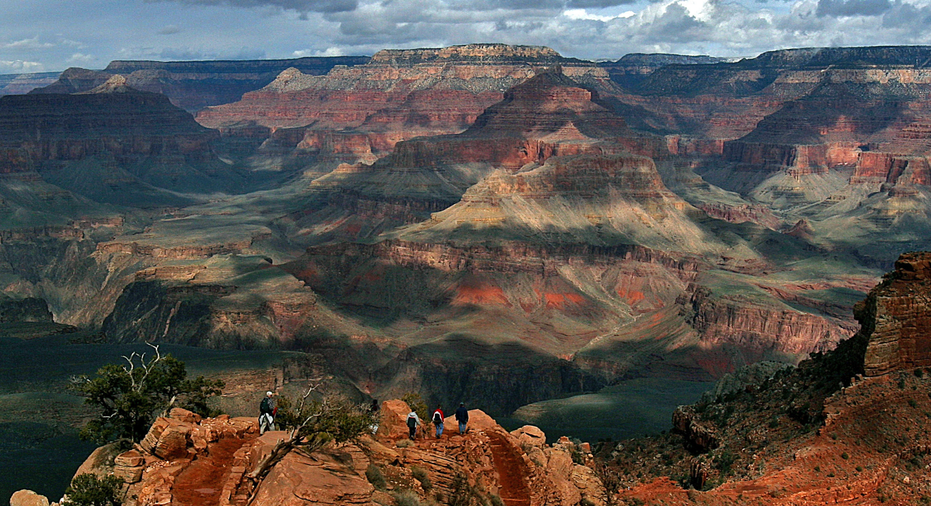Court keeps ban on new mining claims around Grand Canyon

FLAGSTAFF, Ariz. – A U.S. appeals court has kept in place an Obama-era ban on new mining claims around the Grand Canyon, but a review under the Trump administration is putting it in jeopardy.
The decision Tuesday by the 9th U.S. Circuit Court of Appeals comes as a U.S. House committee heard testimony on access to minerals on public lands and dependence on foreign imports. The U.S. Forest Service under President Donald Trump has proposed reviewing the 20-year ban on new mining north and south of the Grand Canyon.
Former President Barack Obama's Interior secretary made more than 1 million acres outside Grand Canyon National Park off limits to new mining claims in 2012. It didn't affect the roughly 3,000 mining claims that existed before it went into effect, which federal officials say could result in less than a dozen mines.
The area is rich in high-grade uranium ore, and the mining industry, Republicans in Congress and some counties in Arizona and Utah said cutting off access eliminates hundreds of jobs in a remote area and puts the nation's security at risk. Uranium was discovered there in the late 1940s and is used in nuclear power plants.
The Federal Land Policy and Management Act gives the head of the Interior Department authority to withdraw 5,000 or more acres from mining but not for longer than 20 years without congressional approval.
The 9th Circuit said the decision to implement the ban carefully balanced the potential economic benefits of mining against possible risks to environmental and cultural resources and did not violate federal laws.
The National Mining Association, among those challenging the ban, said it was disappointed with the ruling and is exploring its options. It can ask for a new hearing in the 9th Circuit or appeal to the U.S. Supreme Court.
"Unwise and unwarranted mineral withdrawals are bad public policy that ignore the vast sectors of our economy that depend upon a reliable and secure supply chain of minerals and metals," Katie Sweeney, a senior vice president and general counsel for the association, said at the House Committee on Natural Resources hearing.
Luke Popovich, a spokesman for the association said, "It is now time for the Congress and the administration, working with the impacted states, to re-evaluate whether the withdrawal was justified based on the scientific, technical and socio-economic facts."
Conservationists say the ban is crucial for protecting water and the Grand Canyon, a national park visited by more than 5 million people a year. The U.S. Geological Survey has found some water sources in the region are contaminated with arsenic and uranium but says more information is needed to determine the extent.
Carletta Tilousi, a councilwoman on the Havasupai reservation deep in a gorge off the Grand Canyon that's accessible by foot, mule or helicopter and known for its blue-green waterfalls, said an environmental catastrophe easily could wipe out the roughly 775 tribal members who live there.
She urged the congressional committee to maintain protections.
"There are too many risks and many unanswered questions pertaining to the long-term effects of the groundwater contamination," she said. "The Grand Canyon should be protected for all of humanity and the residents of the state of Arizona."
Roger Clark of the Flagstaff-based Grand Canyon Trust said he's relieved the Interior secretary's authority to set aside land has been upheld but is uneasy about the possibility of the Trump administration overturning it without much hope of an appeal.
Weeks ago, the Forest Service proposed reviewing the 20-year ban after Trump issued an executive order for federal agencies to eliminate restrictions on energy production. An agency spokeswoman, Babete Anderson, said no action has been taken since.
In a separate but related ruling Tuesday, the 9th Circuit rejected a challenge to a uranium mine south of the Grand Canyon but within the area where new claims are prohibited.
The Forest Service found in 2012 that Energy Fuels Inc. had a valid operations plan for its Canyon Mine and had shown sufficient quality and quantity of uranium ore to mine at the site. The company's claims predated the ban.
Energy Fuels spokesman Curtis Moore said more work needs to be done and no decision has been made on when to start mining operations.



















